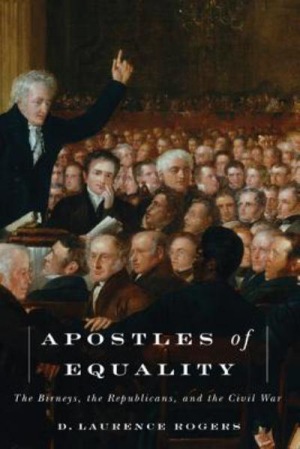| Home | Sports | Community | Business | Schools | Government | Economy - Local |
| Downtown | The Scene | History | Contests | BOXING | KA$H FOR KARAOKE | Politics |
Kentucky Slave Raids in Michigan Ignited Civil War 54 Years Earlier
|
|||||||||||||||||
| Printer Friendly Story View |

"Apostles of Equality: The Birneys, the Republicans and the Civil War," by Dave Rogers and published by Michigan State University Press and released Oct. 31, 2011.
The U.S. Civil War started in April, 1861 with the bombardment by Confederates of federal Fort Sumter in the harbor of Charleston, South Carolina.
Right?
Not exactly. The first armed conflict between the eventual Northern and Southern combatant forces was 54 years earlier, in 1807, in Detroit, Michigan Territory.
Kentucky slaveholders chasing escaped black slaves into Michigan ignited Civil War type fighting on several occasions.
The 1807 incident and other aggression by Kentuckians are detailed in a new book, "Apostles of Equality: The Birneys, the Republicans and the Civil War," published by Michigan State University Press and released today, Oct. 31, 2011.
The author, who happens to be this columnist, contends with authority from U.S. Federal District Court historical files, that Michiganians led by tavern keeper Richard Smyth in 1807 said "no" to slaveholder efforts to return escaped slaves.
Smyth, also a justice of the peace, and like-minded anti-slavery friends, threatened to tar and feather territorial attorney general Elijah Brush if he allowed the return of nine fugitives who had fled to Canada.
In the 1820s through the 1840s, with weapons and massed forces, Michiganians several times stopped Kentucky raiding parties from returning fugitive slaves.
That these were no minor dustups was shown in 1847 when about 200 Michigan men led by Cassopolis blacksmith Bill Jones arrested a Kentucky slave raiding party led by a minister.
These actions take on more meaning in view of the response by Kentuckians to Michigan obstinance. Calling it the "Michigan Outrages," Kentucky demanded stronger laws which led to the Fugitive Slave Law of 1850. By requiring whites to be personally involved in enforcing the law, the growing sectional dispute was further inflamed.
Forcing whites by federal law to become part of the slave control process also helped inform a larger part of the voting populace, at least at the North, of the evils of slavery.
"Although Kentucky never officially joined the Confederacy, it had been split off from Virginia and was a hotbed of pro-slavery sentiment going back to its admission as a state in 1792," said the author.
Bay City was headquarters for native Kentuckian and reformed slaveholder James G. Birney's anti-slavery crusade that led to the Civil War and one of the most monumental political changes in history.
While living in Saginaw County from 1841 until 1853, Birney led organizing in Michigan of the Republican Party, the populist movement that elected Abraham Lincoln in 1860.
Birney's sons, William and David, both of whom had lived a short while in Bay City while it was part of Saginaw County, became important Union Army generals in the war.
"The Civil War, leading to the 1863 Emancipation Proclamation by President Lincoln, freeing four million slaves, transformed the nation from supporting slavery to opposing it," said the author.
It could be said, therefore, that the movement for universal freedom, one that spread worldwide, traces its roots to Birney's organizing while living in Bay City.
The Magna Carta, enshrining rights of freemen signed by King John in England in 1215, the American Revolution of 1783, and the French Revolution of 1787 are comparable political movements, according to the author.
How many towns can claim such a heritage?
###
| Printer Friendly Story View |

|
Prior Article
March 5, 2025 by: Stephen Kent St. Patricks Parade 2025 - IT's TIME |

|
Next Article
March 5, 2025 by: Stephen Kent St. Patricks Parade 2025 - IT's TIME |
"The BUZZ" - Read Feedback From Readers! |
|
m_kusmierz Says:
On October 30, 2011
at 11:56 PM
Your question, how many can claim such history, is one I have come to realize since I retired and have learned much about how rich Bay City's history really is. Unfortunately, not many know or seem to care about the past, thats truly a shame.
|
|
dswacks Says:
On October 31, 2011
at 12:19 AM
at last your book is out nice cover congrats Dave
|
|
|

Dave Rogers |
|
|
|
Printer-Friendly Story View
0200 Nd: 02-23-2026 d 4 cpr 1
12/31/2020 P3v3-0200-Ad.cfm
SPONSORED LINKS
12/31/2020 drop ads P3v3-0200-Ad.cfm
